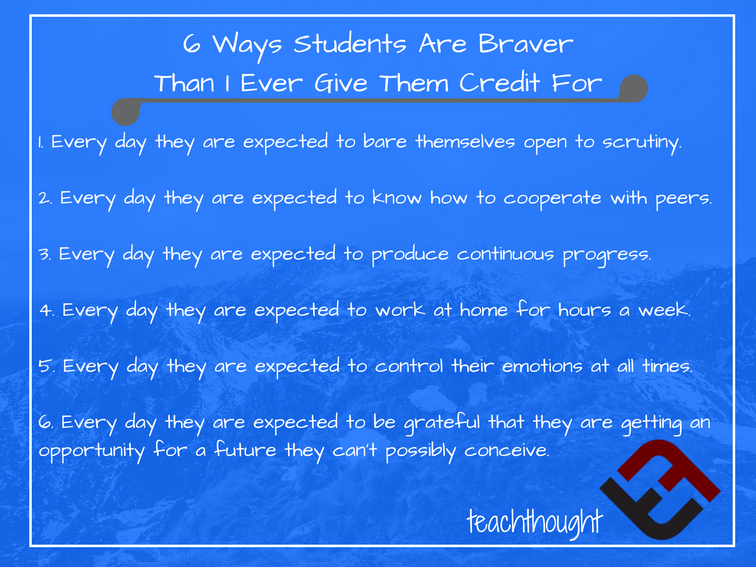
6 Ways Students Are Braver Than I Ever Give Them Credit For
by Paul Moss, edmerger.com
Students are incredibly brave every day.
And sometimes, when I am having a difficult time with a class, or specific students, I need to remind myself of these facts:
1. Every day they are expected to bare themselves open to scrutiny.
Every day they put themselves on the line in classes in what they say, and what they produce. They often live in dread of being asked about something that they haven’t understood, and considering that social development is a teen’s primary focus, (believe it or not, it’s before academic development) pushing through the potential embarrassment of answering questions incorrectly in front of their friends is incredibly brave.
Do well-intentioned teachers exacerbate this in using questioning techniques designed to challenge and push for deeper learning? As an interesting corollary, this bravery of students is made entirely more apparent if you consider how ironic it is that most teachers have a great fear of observation themselves.
2. Every day they are expected to know how to cooperate with peers.
Few teachers teach cooperative learning. I myself have little idea how to do it beyond a few simple strategies, yet still put students into groups, and expect the best out of it. Bearing in mind the social development needs mentioned above, often, groups are formed with students who have little connections to each other, or worse, who have grievances with each other. We expect a mature approach to group work, when in reality most adults can’t stand to work alongside a colleague that they are not really in sync with.
Yes, I know sometimes we have to, but how unproductive is it?
3. Every day they are expected to produce continuous progress in up to 10 subjects.
Can you remember the last CPD day you went to? I bet there were a few sessions that were almost unbearable? Yet deemed as important. Can you imagine having to go to such a session practically every day, and remain engaged, and interested, and productive? Welcome to the brave student’s world.
4. Every day they are expected to work at home for hours a week.
You know what it’s like coming home from a hard days teaching, exhausted, stressed, and having to prepare for the next day. These are times you either call on a higher power, or question its existence. I’m not against homework, as there is a time and a place for it, but how it is currently distributed, with teachers setting work without knowing how much has already been set by other teachers, leads to overload and unnecessary pressure on students. It’s a brave student who pushes on through this.
5. Every day they are expected to control their emotions AT ALL TIMES.
As teachers we tend to insist on students being able to put aside emotions in times when it inhibits academic progress. Of course this isn’t our preferred position, but in a results and progress dominated school culture, we have little choice but to expect students to push past ALL emotional situations to complete work. I’m not a scientist, but there seems to be a direct relationship between home stability and emotional resilience.
Yet we expect maturity from those who haven’t had it modeled in their home life. We sometimes belittle how significant social conflicts can actually be, and how peer perception can rule an entire existence, and again expect more maturity and resilience in times when peer connections are fragile. It takes great bravery to remain composed and focused in such times, and I salute students who can achieve this. I’m not sure I’ve mastered it yet, and I’m 44 years old.
6. Every day they are expected to be grateful that they are getting an opportunity for a future they can’t possibly conceive.
Can you remember yourself how uncertain things seemed when you were 15? How well did you really understand what opportunities doing well at school would open up for you? I myself had no concept of it, and was simply going along for the ride mostly through fear of retribution if I didn’t.
As a student, not a single lecture (and there were many many many of them) about the future had any relevance to me. I could barley grasp the next week, let alone 10 years in to the future. In fact, anyone who was older than 18 was a dinosaur in my eyes. The irony of it all now as a teacher is that I often dismiss as disrespectful those students I see protesting (through their behavior) against this notion of preparing for a future. Upon reflection, perhaps they are braver than I will ever know.
It is in fact remarkable that there aren’t more students who simply can’t cope with all of these demands.
Yet most students do. They turn up day after day, in all weather, sometimes ill, sometimes emotionally drained, sometimes physically tired, sometimes sleep deprived, sometimes feeling over stimulated, even sometimes with the giggles, and they usually power on regardless and rise to unwavering expectations.
They are braver and more resilient than I give them credit for, and I am going to remember that the next time I jump to conclusions when work is not being completed in class.
